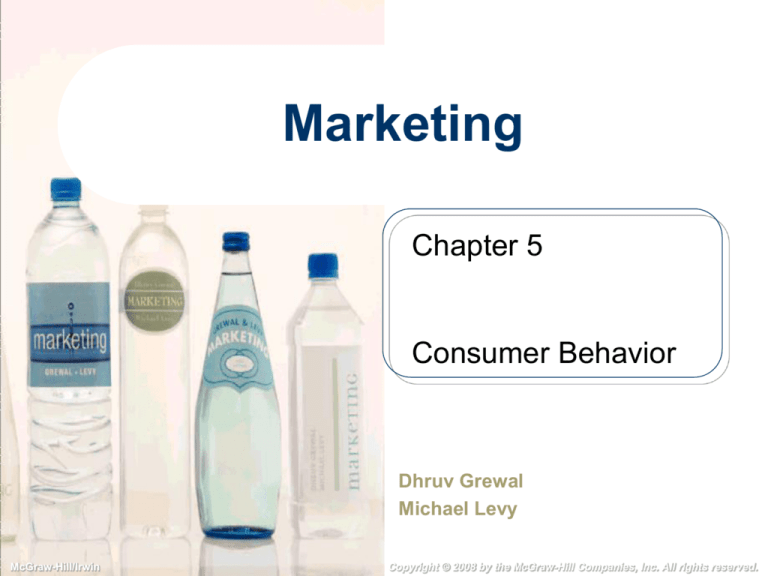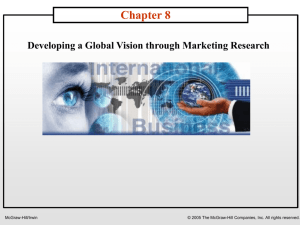
Marketing
Chapter 5
Consumer Behavior
Dhruv Grewal
Michael Levy
McGraw-Hill/Irwin
Copyright © 2008 by the McGraw-Hill Companies, Inc. All rights reserved.
5-2
Netflix
1.5 million subscriber households
18,000 titles
25 strategically located distribution centers
Changing “in store” to “in home” selection
Key partnership promotions
© 2007 McGraw-Hill Companies, Inc., McGraw-Hill/Irwin
5-3
Consumer Behavior
Use principles and
theories from
sociology and
psychology
Understand consumer
actions
Develop basic
strategies to deal with
those actions
Understand why
people buy products
or services
© 2007 McGraw-Hill Companies, Inc., McGraw-Hill/Irwin
5-4
Meet Eva
Problem: Getting access
to the latest video releases
and movies.
Alternative Solutions:
1. Join local movie rental (i.e. Blockbuster store)
2. Subscribe to premium cable
3. Subscribe to online movie rental (i.e. Netflix)
© 2007 McGraw-Hill Companies, Inc., McGraw-Hill/Irwin
5-5
Eva’s Questions
Which alternative
gives me the best
overall value?
Which alternative is
more likely to attract
friends over to watch
movies?
© 2007 McGraw-Hill Companies, Inc., McGraw-Hill/Irwin
5-6
The Consumer Decision Process
5-7
Types of Buying Decisions
© 2007 McGraw-Hill Companies, Inc., McGraw-Hill/Irwin
5-8
Types of Buying Decisions
Limited Problem Solving
Habitual Decision Making
Extended Problem Solving
Impulse Buying
© 2007 McGraw-Hill Companies, Inc., McGraw-Hill/Irwin
5-9
Test Your Knowledge
What type of
and effort?
A)
B)
C)
D)
buying decision requires the least amount of time
limited problem solving
habitual decision making
extended problem solving
impulse buying
5-10
Need Recognition
Functional needs
Psychological needs
© 2007 McGraw-Hill Companies, Inc., McGraw-Hill/Irwin
5-11
Search for Information
Internal Search for Information
External Search for Information
© 2007 McGraw-Hill Companies, Inc., McGraw-Hill/Irwin
5-12
Factors Affecting Consumers’
Search Process
Perceived Benefits
versus
Perceived Costs
Discussion question
What is the difference in search time between the following: A wedding gift
for a) coworker, b) your brother, c) your best friend?
© 2007 McGraw-Hill Companies, Inc., McGraw-Hill/Irwin
5-13
The Locus of Control
Internal Locus of Control
Control = more search activities
External Locus of Control
Fate, external factors = why bother
© 2007 McGraw-Hill Companies, Inc., McGraw-Hill/Irwin
5-14
Actual or Perceived Risk
Financial risk
Performance risk
Psychological risk
5-15
Type of Product or Service
Specialty goods/services
Shopping goods/services
Convenience goods/services
© 2007 McGraw-Hill Companies, Inc., McGraw-Hill/Irwin
5-16
Test Your Knowledge
Consumers can spend considerable time searching for both
specialty and shopping goods or services; the difference lies in
_______________.
A)
the amount of time they have
B)
the amount of money they have budgeted
C)
the psychological risk
D)
the kind of search
5-17
Evaluation of Alternatives: Attribute Sets
Universal Set
Retrieval Set
Evoked Set
Choice
5-18
Evaluation of Alternatives:
Evaluate Criteria
Evaluative Criteria
Determinant Attributes
Discussion question
What are some of the features of a vacation that would be in your
evaluative criteria?
© 2007 McGraw-Hill Companies, Inc., McGraw-Hill/Irwin
5-19
Evaluative Criteria
How do consumers begin to evaluate different
alternatives, and what important attributes and
criteria do they use?
5-20
Case in Point:
Carnival Connections
Challenge
Answer
Results
To encourage small groups to
travel together and understand the
preferences of these groups.
Establish a social networking site that
allows small groups to plan and
coordinate a cruise vacation as well
as invite others to participate in the
cruise.
A “soft launch” in Jan, 2006 to better
understand consumers use and
needs from the site.
© 2007 McGraw-Hill Companies, Inc., McGraw-Hill/Irwin
5-21
Evaluation of Alternatives:
Consumer Decision Rules
Entertainment
Number of
Days
Meals
Price
Importance
Weights
0.4
0.1
0.3
0.2
Carnival
10
8
6
8
8.2
Holland
America
8
9
8
3
7.1
Celebrity
6
8
10
5
7.2
© 2007 McGraw-Hill Companies, Inc., McGraw-Hill/Irwin
5-22
Evaluation of Alternatives: Decision
Heuristics
Price
Product
Presentation
?
Brand
© 2007 McGraw-Hill Companies, Inc., McGraw-Hill/Irwin
5-23
Test Your Knowledge
Decision heuristics are ________ that help a consumer narrow
down his or her choices.
A)
mental shortcuts
B)
breathing exercises
C)
logical steps
D)
compensatory decision rules
5-24
Purchase and Consumption
Ritual consumption
© 2007 McGraw-Hill Companies, Inc., McGraw-Hill/Irwin
5-25
Understanding Rituals
How does someone plan a ritual event
that they have never planned before?
5-26
Case in Point:
Grooms Guide to Weddings
Challenge
To involve the future groom in the
wedding planning.
Answer
The Knot is a one stop shop for the
2.4 million couples preparing for a
wedding in the U.S. The site includes
information about customs, traditions
and products for any wedding.
Results
3.2 million unique visitors each a
month, 3,000 new members per day
and growing.
© 2007 McGraw-Hill Companies, Inc., McGraw-Hill/Irwin
5-27
Postpurchase:
Customer Satisfaction
Customer contact
Encourage feedback
Provide money back guarantee
Build realistic expectations
Demonstrate correct product use
© 2007 McGraw-Hill Companies, Inc., McGraw-Hill/Irwin
5-28
Postpurchase: Dissonance
Firm’s attempt to reduce dissonance by
reinforcing the decision
Thank you letters, congratulations
letters, quality ratings
Discussion question
What other ways do firms
reinforce purchase decisions?
© 2007 McGraw-Hill Companies, Inc., McGraw-Hill/Irwin
5-29
Ethical Dilemma 5.1: Dissatisfied
Customers Use ihate____.com
Customer complaint system
Customer service failure leads to consumers
seeking other means
Effective means of raising complaints
The Complaint Station - tribe.net
© 2007 McGraw-Hill Companies, Inc., McGraw-Hill/Irwin
5-30
Factors Influencing the Consumer
Decision Process
Social
Factors
Situational
Factors
Consumer
Decision
Process
Psychological
Factors
Marketing Mix
Elements
5-31
Psychological Factors
© 2007 McGraw-Hill Companies, Inc., McGraw-Hill/Irwin
5-32
Psychological Factors: Motives
© 2007 McGraw-Hill Companies, Inc., McGraw-Hill/Irwin
5-33
Test Your Knowledge
What psychological factor is a need or want that is strong
enough to cause the person to seek satisfaction?
A)
learning
B)
perception
C)
motive
D)
attitude
5-34
Psychological Factors: Attitude
Attitude
Behavioral
Cognitive
Affective
© 2007 McGraw-Hill Companies, Inc., McGraw-Hill/Irwin
5-35
Psychological Factors: Perception
Discussion question
How has society’s perception
of people with tattoos changed
in recent years?
© 2007 McGraw-Hill Companies, Inc., McGraw-Hill/Irwin
5-36
Psychological Factors: Learning
Affects both attitudes and
perceptions
Affected by social
experiences
5-37
Social Factors: Family
Decision makers
Influencers
© 2007 McGraw-Hill Companies, Inc., McGraw-Hill/Irwin
5-38
Social Factors: Reference Groups
Family
Friends
Coworkers
Famous
people
Offer information
Provide rewards
for specific
purchasing
behaviors
Enhance
consumer’s selfimage
© 2007 McGraw-Hill Companies, Inc., McGraw-Hill/Irwin
5-39
Test Your Knowledge
Which of the following is a way in which reference groups might
provide information to consumers?
A)
Leading by example
B)
Indirectly, through observation
C)
Contacting the seller
D)
Web research
5-40
Social Factors: Culture
Example: Weddings
Gathering
Ritual
Vows
Celebration
© 2007 McGraw-Hill Companies, Inc., McGraw-Hill/Irwin
5-41
Situational Factors
© 2007 McGraw-Hill Companies, Inc., McGraw-Hill/Irwin
5-42
Entrepreneurial Marketing 5.1:
Zipcar – The Urban Rent-a-car
Discussion question
What situational factors led to the creation of Zipcar?
© 2007 McGraw-Hill Companies, Inc., McGraw-Hill/Irwin
5-43
Chapter 5 Glossary
Extended problem solving: Occurs when a buyer devotes considerable time
and effort to analyzing alternatives; common when the customer perceives
that the purchase decision entails a lot of risk.
External search for information: The buyer seeks information outside his or
her personal knowledge base to help make the buying decision.
Functional needs: Needs that pertain to the performance of a product or
service.
Habitual decision making: A purchase decision process in which consumers
engage with little conscious effort.
Impulse buying: A buying decision made by customers on the spot when they
see the merchandise.
Internal search for information: The buyer examines his or her own memory
and knowledge about the product or service, gathered through past
experiences.
Limited problem solving: Occurs during a purchase decision that calls for, at
most, a moderate amount of effort and time.
Psychological needs: Needs that pertain to the personal gratification
consumers associate with a product and/or service.
Ritual consumption: Refers to a pattern of behaviors tied to life
events that affect what and how we consume.






